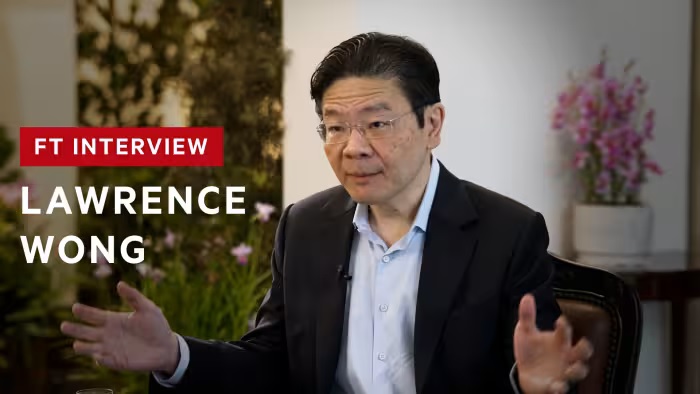
Singapore’s prime minister warns of ‘messy’ transition to post-American order – Lawrence Wong says no other country can fill vacuum left by US.
Singapore’s prime minister has called for immediate action to promote trade liberalization and protect global common interests as he warned the world to expect a “messy” transition to a post-American order.
In an interview with ‘Financial Times’ at his official residence in the city-state, Lawrence Wong said the world was in the middle of a great transition that could take a decade to play out.
“There is no doubt it will be messy and unpredictable because America is stepping back from its role as global insurer but there’s no other country that is able or willing to fill the vacuum,” he said.
Singapore, a major beneficiary of the postwar era of globalisation and multilateralism, could not afford to “wait for things to happen or hope that things magically will fall into place”, he added.
Action must be taken now, he said, “in building new trade connections and keeping up the momentum of trade liberalisation. We can’t do it alone, but we will do it with other like-minded countries”.
Wong, a career civil servant turned politician who took over as prime minister last year, was speaking ahead of two gatherings of regional leaders next week — the Association of Southeast Asian Nations summit in Malaysia and the Asia-Pacific Economic Cooperation forum in South Korea. US President Donald Trump is expected to attend both.
Trade hub Singapore is one of the countries most exposed to the shake up of global commerce brought about by Trump’s “liberation day” tariffs this year.
Though Singapore received a relatively low 10 per cent tariff rate, most of its south-east Asian neighbours were hit with 19 per cent, threatening the region’s intricate supply chains.
Wong pointed to the recently launched Future of Investment and Trade Partnership — whose founders include Singapore, the United Arab Emirates and New Zealand — as an example of smaller nations uniting to promote open trade.
He said there was also potential to bring the EU and the 10-member Asean bloc together in a free trade agreement, though most deals between Europe and south-east Asia have been on a country-by-country basis. “We see [these] as new opportunities to reinvigorate trade,” he said.
“We are in a world where the global system is starting to [become] more and more clogged up. But we would like to keep the arteries of trade open and maybe create new arteries.”
The prime minister insisted that a new multilateral architecture was needed because the America-first agenda of the Trump administration was not a temporary phenomenon.
“It reflects a broader change in political culture and also in society itself... a feeling that America has not benefited from the current global order that it had put in place and it is not prepared to do the heavy lifting to keep the order going,” Wong said.
Describing Singapore’s economy as the “canary in the coal mine”, Wong said there were signs of businesses holding back on investment and recruitment because of the impact of tariffs.
“Because we are so open and so exposed to the external environment, we are the first to feel it when the external environment starts to weaken,” he said. “We didn’t feel it in the first half of this year... we are starting to feel some slowdown now.”
The city-state’s economy grew 2.9 per cent in the third quarter compared with a year earlier, down from 4.5 per cent in the previous three months.
Wong said the initial impact of the tariffs had not been as heavy as feared because companies had frontloaded orders before the levies took effect, while technological breakthroughs in areas such as artificial intelligence had supported the economy.
Though Singapore received one of the lowest tariff rates, it could still be hit by sector-specific levies on pharmaceuticals and semiconductors, two of its biggest exports to the US. Tariffs on re-exports, designed to target Chinese-made goods, are also expected to be damaging to Singapore as one of the world’s biggest transshipment hubs.
Singapore’s ability to maintain a close relationship with China, its largest trading partner, while also having a tight security and political alliance with the US has come under unprecedented strain since Trump came to power.
read more in our Telegram-channel https://t.me/The_International_Affairs

 11:16 29.10.2025 •
11:16 29.10.2025 •






















